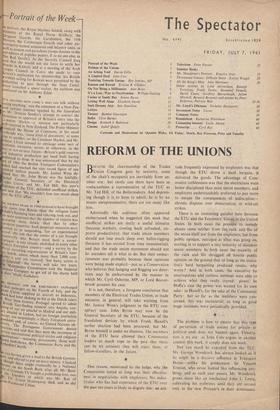Portrait of the Week-
kuwirt, the Royal Marines landed, along with lements of the Royal Horse Artillery, the ragoon Guards. the Carabiniers, the 11th ussars, the Coldstream Guarils and other pic- uresquely-named armoured and infantry units, as ell as airmen and parachute troops (known to the ub-editors of popular papers, if to no one else, as the Red Devils'). At the Security Council Iraq aid that she would not use force to settle her ispute in Kuwait, and at a meeting of the Arab eague Council in Cairo she made to veto Llwait's application for membership. Six British arships sailing for Kuwait were permitted by the uthorities to pass through the Suez Canal. sraei launched a space rocket. An earldom was onferred on Sir Anthony Eden.
T's AMAZING; HOW- LONG a man can talk without ying anything,' was the comment of a New Zea- rid cabinet minister (quoted by the Guardian) n Mr. Duncan Sandys's attempt to convert the °minion to approval of Britain's entry into the ernmon Market—a mission not particularly sll-received in New Zealand, The Prime Minister romised the House of Commons, in his usual .orthright way, 'some kind of document,' at some me or another, on the Common Market, and Mr. Iwyn Lloyd seemed to envisage some sort of conomic measures, severe or otherwise, in the ear or not-so-near future--Britain's gold reserves rid industrial production per head both having ntinued to drop. It was announced that by the
d of 196() the British Transport Commission's °kit had reached the nice round figure of one undred million pounds. Mr. Justice Winn de- hired that Mr. John Byrne was the lawfully- leeted General Secretary of the Electrical rades Union, and Mr. Ted Hill, this year's airman of the TUC, defended unofficial strikes, d said that 'We shouldn't lose too much sleep ver the ETU affair.'
L -iotausi TRADF. in 1960 proved to have brought ttle more into Britain than the refugees from ritain's licensing laws and catering took out, and W were surprised that the number of visitors was creasing more slowly than that to other hropean countries. Such desperate measures were sorted to as suspending, 'for an experimental nod.' the rule that the owner of a car brought nporarily into Britain must have a carnet- OINue- -a rule already abolished in every other estern European country—and a survey by the lcial motoring organisations of Britain's four-
hotels. about which more than 2,000 com-
a year are received: 'but hasty action is Pt intended'—the survey will take two years. Monopolies Commission told the Imperial °ace() Company to get rid of the shares held their, 'rivals' Gallahers.
R. IGINNEDY AND MR. KHRUSIICTIEV exchanged dial messages on the Fourth of July, and the v.iel Union supplied jet aircraft to Indonesia. Ich had been shaking its fist at the Dutch rulers . West New Guinea. Portugal agreed to admit British 'fact-finding mission' into Angola, con- ing of our air attache in Madrid and our mili- Y attache in Lisbon, but no foreign journalists accept, not surprisingly, a Daily Telegraph corre- ondent) and, of course, no United Nations ob- rvers. The Portuguese Government denied rocities and said that they were the invention of rtain international political circles and religious ganisations'—meaning, presumably, those well-
own bedfellows, the Communist Party and the ethodist Church.
.1.cc having given a lead to the British Govern- nand offered to put up more money, it looked though there might eventually be a National enatre on the South Bank after all. Mr. Bern- ' _of Granada Ty bought a publishing firm. one ,tne_ founders of which was Mr. Kee of
I V. Ernest Hemingway died, and so did uts-Ferdinand Cdline.


























































 Previous page
Previous page